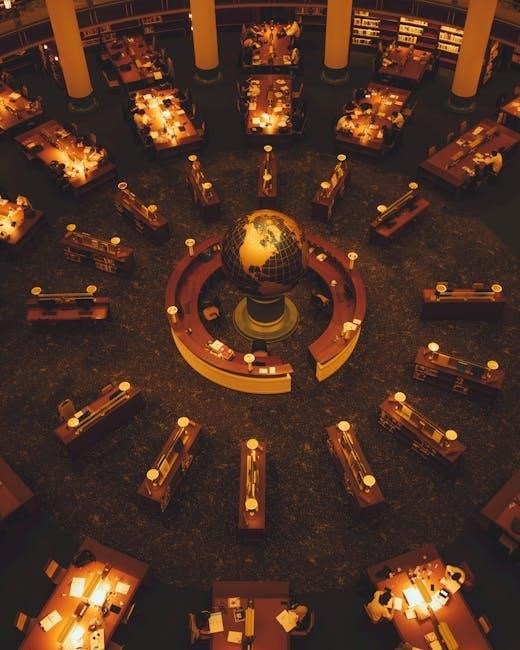The Circle by Dave Eggers is a gripping dystopian novel exploring themes of privacy, transparency, and the ethical implications of technology in modern society.
Overview of the Novel and Its Author
Dave Eggers, a renowned American author, crafted The Circle, a dystopian novel published in 2013. The story follows Mae Holland, a young woman who joins a powerful tech company called The Circle, which dominates the internet and social media. As Mae rises within the company, she faces ethical dilemmas and the blurring of privacy boundaries in a hyper-transparent world. The novel explores themes of surveillance, data control, and the sacrifices made for technological progress, offering a cautionary tale about modern society’s obsession with connectivity.
Eggers’ vivid portrayal of a tech-driven utopia-turned-dystopia resonates with contemporary concerns about privacy and the ethical implications of technology. Through Mae’s journey, The Circle challenges readers to reflect on the consequences of unchecked technological advancement and the loss of personal freedoms in a digitally dominated world.
Why “The Circle” is Relevant in the Digital Age
The Circle by Dave Eggers is a timely and thought-provoking novel that explores the intersection of technology, privacy, and society. In an era dominated by social media, surveillance, and data-driven corporations, the book serves as a cautionary tale about the dangers of unchecked technological advancement. The Circle, a powerful tech company, mirrors real-world giants like Google and Facebook, raising critical questions about the ethical implications of their influence. Eggers’ depiction of a world where privacy is eroded and transparency is enforced resonates deeply in today’s digital landscape, making the novel a timeless commentary on modern life.
By examining the consequences of a hyper-connected world, The Circle challenges readers to reflect on the trade-offs between convenience, security, and personal freedom. Its themes of data control, corporate power, and the loss of individual agency are increasingly relevant as technology continues to reshape society. This makes the novel not only a compelling story but also a vital contribution to ongoing conversations about the future of the digital age.

Author Background: Dave Eggers
Dave Eggers, born October 14, 1970, in Boston, is a renowned American author, publisher, and philanthropist, known for his literary contributions and social advocacy.
Dave Eggers’ Literary Career and Major Works
Dave Eggers emerged as a prominent literary figure with his memoir A Heartbreaking Work of Staggering Genius, which gained critical acclaim. His subsequent works, such as You Shall Know Our Velocity and A Hologram for the King, solidified his reputation as a versatile writer. Eggers’ unique narrative style blends introspection with social commentary. Founder of McSweeney’s, he has championed innovative storytelling and supported emerging authors. His ability to explore complex themes through engaging prose has made him a significant voice in contemporary literature, with The Circle being one of his most impactful works.
Eggers’ Perspective on Technology and Society
Dave Eggers critiques the pervasive influence of technology on modern life through his work. In The Circle, he explores themes of surveillance, privacy, and the erosion of individual freedom. Eggers highlights how tech companies, under the guise of progress, often manipulate users into sacrificing personal autonomy. His narrative reflects a deep concern about the ethical implications of unchecked technological advancement and its impact on democracy. Eggers’ perspective underscores the tension between innovation and the preservation of human values in a hyper-connected world.

Plot Summary of “The Circle”
The Circle follows Mae Holland, a young woman who joins a powerful tech company, initially thrilled by its innovative culture. Her journey reveals dark truths about transparency, privacy, and control.
Mae Holland, a young and ambitious woman, begins her journey at The Circle, a revolutionary tech company promising utopian transparency. Initially thrilled by the opportunity, she embraces the company’s innovative culture and ideals. As she rises within the organization, Mae faces ethical dilemmas, questioning the true cost of constant surveillance and data control. Her transformation from an idealistic recruit to a morally conflicted employee highlights the tension between personal freedom and societal demands in a hyper-connected world.
The Rise of The Circle as a Powerful Tech Company
The Circle emerges as a revolutionary tech giant, promising a utopian vision of total transparency and connectivity. Founded by visionary leaders, it rapidly integrates users’ personal emails, social media, and finances into a single online identity. The company’s sprawling California campus symbolizes innovation and progress. However, as The Circle’s influence grows, so does its control over personal data, raising significant ethical concerns. Its ascent from a promising startup to a dominant force reflects the tension between technological advancement and individual privacy in a hyper-connected world.
Major Themes in “The Circle”
Privacy, surveillance, and data control are central, highlighting the tension between technological advancement and individual freedom. The novel also explores democracy, transparency, and ethical dilemmas in a hyper-connected world.
Privacy, Surveillance, and Data Control
Privacy and surveillance are central themes in The Circle, as the novel examines how a powerful tech company erodes personal freedoms through pervasive data collection. Mae Holland’s gradual loss of privacy mirrors societal trends, raising questions about the ethics of unchecked technological advancement. The Circle’s mantra of transparency justifies its invasive practices, blurring the line between convenience and control. This exploration of data control highlights the tension between innovation and individual rights, offering a cautionary tale about the consequences of sacrificing privacy for a connected world.
Democracy, Transparency, and Ethics in Technology

The Circle critiques the intersection of democracy and technology, exploring how transparency, while seemingly virtuous, can undermine ethical standards and personal freedoms. The novel portrays a tech giant whose influence spreads beyond business, shaping governance and societal norms. Eggers highlights the tension between technological progress and ethical responsibility, as the Circle’s pursuit of transparency erodes privacy and autonomy. This raises critical questions about the role of technology in democracy and the potential for unchecked power to manipulate public discourse and individual choices.
Cultural and Social Impact of the Book
The Circle has sparked global discussions about technology’s role in society, privacy, and ethics, becoming a cultural touchstone for debates on digital life and corporate power.
Reception of “The Circle” by Readers and Critics
The Circle received widespread critical acclaim for its timely exploration of technology and society. Critics praised Eggers’ ability to address pressing issues like privacy and surveillance, resonating deeply in the digital age. Many reviewers noted the novel’s thought-provoking nature and its relevance to contemporary debates about data control and corporate power. Readers widely discussed the book, with some hailing it as a cautionary tale for the modern world. While a few critics found the narrative heavy-handed, the novel’s impact on public discourse about technology remains undeniable.
The Book’s Influence on Public Discourse About Tech
The Circle has significantly influenced public discourse on technology, sparking debates about privacy, data control, and corporate power. Its portrayal of a tech giant’s pervasive influence resonated widely, prompting readers to reflect on their digital lives. The novel’s exploration of surveillance and transparency has been compared to Orwell’s 1984, highlighting its relevance in today’s hyper-connected world. By addressing these issues, Eggers’ work has encouraged critical thinking about the ethical implications of technology and its impact on society, fostering a broader conversation about the future of the digital age.

Symbolism and Key Concepts
The Circle uses the titular concept to symbolize unity and totalitarian control, while its campus and color schemes reflect utopian ideals masking underlying dystopian realities.
The Meaning of “The Circle” as a Metaphor
The Circle serves as a metaphor for a perfect, self-contained system, symbolizing unity and interconnectedness. It represents a utopia where transparency and knowledge are paramount, yet it enforces conformity and suppresses individuality. The Circle’s ideals of a borderless, all-knowing world mirror the allure and dangers of unchecked technological advancement. Its motto, “All that happens must be known,” reflects the tension between progress and privacy, highlighting the ethical dilemmas of a society obsessed with sharing and control; The Circle’s metaphorical significance lies in its portrayal of a utopia turned dystopia, where the pursuit of connection erodes personal freedom and autonomy, ultimately revealing the dark side of unchecked ambition and the loss of human agency in a hyper-connected world.
Other Symbolic Elements in the Novel
Beyond the Circle itself, other symbolic elements enrich the narrative. The campus, with its pristine design, represents a utopia of innovation and control. The color blue, predominant in the company’s branding, symbolizes trust and unity but also subtly enforces conformity. The transparency tubes and open workspaces embody the ideals of visibility and collaboration, yet they erode privacy and individuality. These symbols collectively reflect the tension between progress and autonomy, highlighting the novel’s exploration of a society where freedom is traded for the illusion of a perfect, interconnected world.
Comparison to Other Dystopian Novels
The Circle shares themes of surveillance and societal control with classics like “1984,” but Eggers’ modern twist focuses on tech-driven tyranny, offering a fresh lens on dystopia.
Similarities with “1984” and Other Classic Dystopian Works
The Circle mirrors the oppressive regimes in 1984 and other dystopian novels, where surveillance and control dominate society.
Both depict worlds where personal freedom is sacrificed for the sake of collective unity.
The Circle’s all-knowing tech giant reflects 1984’s Big Brother, emphasizing the loss of privacy.
Eggers’ work serves as a modern cautionary tale, echoing classic themes of technological overreach and societal manipulation.
Unique Aspects of Eggers’ Approach to Dystopia
Dave Eggers’ approach to dystopia in The Circle stands out for its nuanced exploration of technology’s insidious creep into daily life.
Unlike classic dystopian works, Eggers focuses on the subtle erosion of privacy and individuality through voluntary participation.
His portrayal of a utopia-turned-dystopia feels eerily plausible, blending suspense with philosophical inquiry.
Eggers’ emphasis on character psychology and moral ambiguity adds depth, making the novel a thought-provoking commentary on modern society’s relationship with technology.
The Circle remains a timely cautionary tale, urging readers to reflect on technology’s role in society. Its exploration of privacy and ethics continues to resonate deeply.
The Lasting Relevance of “The Circle” in Modern Society
Dave Eggers’ The Circle remains a prophetic warning about the dangers of unchecked technological advancement. Its themes of surveillance, data control, and the erosion of privacy resonate deeply in today’s digital age. As society grapples with the consequences of social media and corporate dominance, the novel serves as a timely reminder of the ethical dilemmas posed by technology. Eggers’ exploration of a world where transparency is mandated and individuality is threatened continues to spark crucial conversations about the balance between progress and personal freedom.
Recommendations for Readers Interested in the Topic
Readers drawn to dystopian themes and critiques of modern technology will find The Circle a compelling and thought-provoking read. Those interested in explorations of privacy, ethics, and societal shifts will appreciate Eggers’ nuanced portrayal of a tech-driven world; The novel is particularly recommended for fans of works like 1984 and Brave New World, offering a contemporary lens on similar concerns. It’s a must-read for anyone reflecting on the role of technology in shaping our lives and values.






